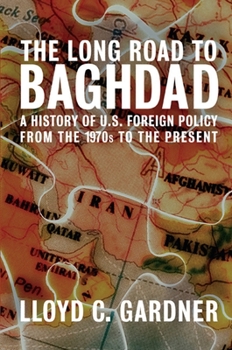The Long Road to Baghdad: A History of U.S. Foreign Policy from the 1970s to the Present
Select Format
Select Condition 
Book Overview
In this stunning new narrative of the road to America's "new longest war," one of the nation's premier diplomatic historians excavates the deep historical roots of the U.S. misadventure in Iraq. Lloyd Gardner's sweeping and authoritative narrative places the Iraq War in the context of U.S. foreign policy since Vietnam, casting the conflict as a chapter in a much broader story--in sharp contrast to the host of recent accounts, which focus almost...
Format:Hardcover
Language:English
ISBN:1595580751
ISBN13:9781595580757
Release Date:October 2008
Publisher:New Press
Length:310 Pages
Weight:1.40 lbs.
Dimensions:1.3" x 6.4" x 9.6"
Related Subjects
20th Century 21st Century Americas History Iran Iraq Iraq War Middle East Military Political ScienceCustomer Reviews
2 ratings
the shocking political revalations
Published by Thriftbooks.com User , 15 years ago
[[ASIN:1595580751 The Long Road to Baghdad: A History of U.S. Foreign PI I olicy from the 1970s to the Present]] I found this book by lloyd Gardner a facinating history of continuing U.S. deceit. Both Bush administrations dealt in appaling lies in order to " sell " the American public on the two Iraq wars. H.W. Bush hardly had to "sell" the first Iraq war.The Kuwait invasion by Sadaam was an Obvious reason.Yet, he still lied about the facts.His son,obviously led by Rumsfeld and Cheny,created a disaster. The facts ,as transcribed by Gardner, are an embarasment to the people of this nation.
Someone Finally Gets it Right!
Published by Thriftbooks.com User , 15 years ago
Professor Lloyd Gardner's account of the process leading to the war in Iraq is the only one I've read that situates the Iraq War in the ongoing struggle within U.S. foreign policy circles to accommodate the Vietnam debacle to the national narrative of ongoing progress. [Disclosure: I studied with Professor Gardner about 20 years ago.] That effort remains unresolved, partly because the immediate post-Vietnam response to that defeat was to change the subject or otherwise refuse to engage the issue in a context inhibited by the ongoing Cold War. Thus Jimmy Carter sought to reorient American foreign policy in the service of morality in his Notre Dame speech, but met with conservative resentment at home of his discussion of foreign policy failures while earning suspicion from the Kremlin. Nor did Walt Rostow's ex post facto claim that our defeat in Vietnam was due to a lack of will open the way to meaningful introspection. Indeed, a deeply held popular belief in the inevitability of American progress led to a widespread refusal to admit that we'd lost the war in Vietnam at all. That refusal was the source of the claims (true, but misleading) that our soldiers had never lost a battle on the ground in Vietnam, as well as the enduring controversy over POWs-MIAs, which continued until diplomatic relations between the two countries were restored in 1995. The neoconservative approach to foreign policy was predicated on a Jacobian division of foreign policy thought into categories marked Before and After Reagan. It was based on a blind faith in the myth of national progress and an implicit rejection of the idea that anything other than deficiencies in moral character could account for any failure of the U.S. to achieve its aims. Consistent with a long-running theme among American conservatives, the neocons rejected diplomacy as a sign of weakness and an opening for threats to American interests. The preferred method of attaining U.S. objectives was force. Faced with this sort of thinking, one could agree, acquiesce or be damned as a weakling and traitor. Such a frame of reference made ruthlessness leading to the falsification of evidence for war, the approval of torture and the outing of Valerie Plame inevitable. It has also led, as Gardner points out, to the mutation of the American military into something considerably more privatized, intrusive and isolated from the country it was created to protect. Similarly, the undermining of this country's constitution, the use of facilities outside the United States to detain people without accountability, reliance on now unlimited domestic wiretapping, the use by George W. Bush of signing statements to declare his refusal to obey the laws he signed, all combine to present unprecedented challenges to the oldest representative democracy on this planet. Whether we can reclaim our country before it slips out of our hands altogether depends entirely on our willingness to confront the things that have been done in our na





